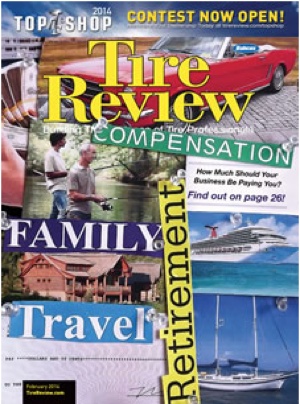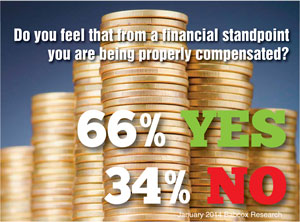 You’ve poured your heart and soul into your dealership, oftentimes building it from the ground up, sometimes rescuing it from financial disaster. Between long days, late nights and working weekends, perhaps there is no business owner more dedicated than you, the independent tire dealer.
You’ve poured your heart and soul into your dealership, oftentimes building it from the ground up, sometimes rescuing it from financial disaster. Between long days, late nights and working weekends, perhaps there is no business owner more dedicated than you, the independent tire dealer.
But how do you ensure that all your time, effort and energy are adequately paying you – now, in the future and when it comes time to retire? And how can you effectively get time away for family, travel or hobbies and still keep things under control at the shop?
It’s a fine line to walk, but one that can be done with the right knowledge, proper planning and trusted employees.
We sought advice from dealers and industry veterans to gain valuable insight that will help ensure your dealership is giving you the right return on your investment – enough time, money and space.
Planning a Paycheck
Taking into consideration the wide array of costs your business faces – from payroll to operations (and more) – it can seem daunting to figure out how to determine what’s left for you, as the owner, at the end of the month. Also factoring into the process are tax issues and the matter of long-term compensation goals, such as building equity in the business.
“Business owners are the risk takers, and should enjoy the benefits of their hard work and inherent risk of owning a business,” says T. Shawn Rasey, president and principal consultant at Redroe LLC, based in Brentwood, Tenn. “My first advice is to make sure dealers have a good tax accountant to help set a financial course that is consistent with the owner’s near- and long-term goals. Their guidance can be invaluable to making sure the owner is optimizing their earnings and sheltering income within the tax code.”
He recommends owners base their income on their dealerships’ earnings, and develop a similar earnings program for employees by designating specific earnings/profit bonus assignments. “From there, the owner can elect earnings or draws based on near-term personal goals, or deferred income for later down the road.”
Richard Lipton, founder of Lipton CPA & Associates, says the first step in setting up compensation is to make certain the business is profitable.
“Once the company is profitable, the owner can take out a fair salary – not just dollars, but also benefits, pension, etc.,” says Lipton, who serves many dealer clients and also has 10 years of experience as a stockholder and manager of family-owned Sam’s Tire Co. in Paterson, N.J.
“If a company’s not profitable, the owner is not going to be making much money. If the business is losing money, there are times when the owner has to miss a paycheck; but if it’s extremely profitable, the owner gets a nice big bonus,” he says.
When working with clients, Lipton performs a customized compensation analysis to determine the amount of profit a dealer should take and how much to allocate as salary versus a pension plan. “We work out a formula of how much you want to allocate toward salary, which is taxable as soon as you receive it. Or if a dealer can afford it, I recommend they put as much as possible into a pension plan.
“When money goes into a pension plan, dealers save money on payroll taxes,” Lipton continues. “They also benefit from tax deferral, assuming they will be at a lower tax bracket down the road when they take money out; they’re also earning dividends in the meantime.”
In times of excess profits, he recommends keeping the bulk of the extra cash in the business throughout the year – “you want to have cash available, for example, if you can do a bulk inventory buy at a discount.” If the surplus still exists at year’s end, dealers can then take an added bonus.
One industry expert said that while there isn’t an exact science to determining salary, due to the widely varying conditions of individual dealerships, owners who aren’t involved in the day-to-day running of the business should take 3% of the company’s gross profit as salary. If the owner is heavily involved and regularly puts in hours at the dealership, he recommends a salary that is 5.5% of gross profits.
There also are other ways to draw income from your business, including taking less salary but writing off numerous purchases – cars, gas, insurance, personal expenses, even boats or recreational vehicles. “As long as an accountant signs off on it, you’re okay,” notes the industry veteran, who preferred not to be named for this article. Another source of income is owning the property on which your dealership sits, and drawing monthly rental income.
“So many dealers think their business owes them a living,” he says. “The business is a vehicle to earning a living – it gets you from point A to point B. It will get you wherever you want to go, but you have to keep fueling it, maintain it, keep it clean and drive it properly.”
 Protecting Profits
Protecting Profits
Since it is recommended that a dealer should draw earnings from the company’s profits, it’s obvious that maximizing those profits is key.
“We independent tire dealers are our own worst enemy – we sell at very low margin pricing,” says Joe Flynn III, president of Flynn’s Tire & Auto Service, based in Mercer, Pa., and with 27 total locations in Pennsylvania, Ohio and New York. He adds that through Flynn’s wholesale division, he sees many dealers who know all their customers by name, going above and beyond to do the best job possible, but undercharge for their work.
“A lot of independent dealers are underselling the market and don’t even know it because they aren’t checking the competition’s prices,” Flynn says. “Make sure you’re charging enough; look at competitors’ prices. Don’t undervalue your quality of service and your relationships with customers.”
Along those lines, Alpio Barbara, owner of Redwood General Tire in Redwood City, Calif., adds, “It is important to ask to be paid fairly for the work we are performing. If you know you do quality work, then you need to bill for it as such. Don’t feel the need to charge less for a job that you know you can do better than anyone else.”
In another move to protect profits, he also recommends setting aside a fund to cover equipment costs or repairs.
During the recent economic downturn, Barbara said the dealership did all it could to bolster profits by closely watching expenses, negotiating better deals with vendors, placing more focus on customer retention with follow-up emails and phone calls, and exploring further marketing options and channels. “As a result sales did go up,” he notes.
At Redwood General, net profit increases from the previous year’s profits are divided among employees. “Share the company’s success with your employees; make them a part of the business,” Barbara advises. “Happier employees will provide greater returns. Plan a modest salary (for yourself) ahead of time, and at the end of the year, take another look at net profits and make a decision on where it goes.”
 Stepping Away
Stepping Away
Aside from salary, your business should be paying you another way – with a desirable quality of life. As enormous a part of your life and livelihood as your dealership is, it’s important to be able to get away every now and then to enjoy time for family, hobbies or vacation.
A common theme is having capable, trustworthy employees in management roles, so when you do step away from the shop, you won’t constantly be worrying about work.
Barbara says he gets time away by “putting a great team together, one that can be trusted with the store to make the right decisions for our customers with the same values and integrity as the owner.”
“Before having the right employees, the owner needs to be in the store more often,” he says. “After putting together a team that he can trust to take care of the store’s needs, he can feel more comfortable taking time away. By hiring the correct employees for the job, it is easy for me to give them trust to make their own decisions so that they can take care of the customers the way I would.”
“My dad used to tell me, ‘Joe, you’ve got to surround yourself with people who are better than you,’” Flynn relates. “I used to get agitated when he told me that, because I always thought he was telling me I wasn’t that good. I now know that he meant. As long as you have good people around you, that makes it a lot easier. If you don’t have the best people, it puts more of a burden on you.”
When his father passed away just over a decade ago, Flynn says he “was extremely overwhelmed and felt desperate and unable to do everything that needed to be done for the business. I literally got down on my hands and knees and asked God to surround me with good people. And that is exactly what’s happened; I’ve had the best people surrounding me the last 11 years.”
Learn to delegate and groom employees to make decisions, advises another industry expert. “Look for good people to run things for you, then empower them and force yourself to step away from the business. You have to trust them; once they make a decision, you have to live with it. If they make a mistake, coach them further.”
He adds if dealers invest in the right software, they can dial into their businesses from anywhere in order to keep tabs on what’s going on – another path toward the peace of mind many dealers need in order to break away.
“In the hectic world of the tire business, it is critical to refresh and recharge periodically,” Rasey says. “One way to do this is to take advantage of supplier and industry events that allow owners to mingle with others facing the same challenges. It also helps to take advantage of new information and trends that can re-invigorate the owner, and help drive positive results in their business.”
He also recommends getting away – completely outside of the business – with family or friends during the year. “Naturally, it depends on the state of development of a business, and the natural business cycles that we all face, but going on trips or scheduling other events or activities that are tailored to the owner’s personal interest is a must.”
 Life’s Next Phase
Life’s Next Phase
Whether you’re a few years or a few decades from retirement, it’s never too early to start planning – in terms of both financial savings and an exit strategy.
“Again, a good tax account is a must, plus a financial advisor who can grasp the goals and variables that change over time to help guide the owner through the long and sometimes arduous process,” Rasey says, adding these experts will help dealers set a course for near-term needs versus longer-term security.
Younger dealers generally have less income, since their businesses are less established and younger families often have more expenses, Lipton notes. “Generally, I advise people in that situation to put away a small amount, anything they can. Because that small amount that someone who’s 25 or 30 years old puts away is going to build up to a nice amount over the years. It’s a forced savings, they’re still getting that tax break and the money is there if they need it in the event of an emergency.”
As an example of a younger dealer, Flynn says he plans to improve his saving for retirement, adding, “Right now I’m just focusing on building the business.” One strategy he has followed so far is purchasing real estate in the form of some of Flynn’s locations.
Lipton advises business owners who are five to 10 years from retirement to put more money into their retirement plan and take less as salary, if possible.
A bit closer to retirement, Barbara says he’s reinvesting in Redwood General by buying the property on which the business sits. He also purchased a piece of property in Arizona, which he uses as a vacation spot.
Aside from financial preparations, the subject of retirement also brings about questions of succession planning. Several years out, start thinking about how you would like to exit your business – selling to an outsider, selling to an employee, passing the company down to family members, etc.
“I personally believe that there are as many ways to structure this as there are dealers that need to do it,” says Rasey. “The trick is setting a clear vision that is consistent with the return on investment in the business, building equity in the business, and meeting a dealer’s custom-tailored goals for retirement.”
“The first step is to determine their personal goal, whether it’s fully retiring or just stepping back but maintaining some level of involvement,” Lipton says. “At some point, someone else will need to take over. You should have a will; you should have a contract or buy-sell agreement that includes a succession plan. And in the meantime, there should be a plan in place in the event of an emergency.”
If passing the business to an employee (or multiple employees) is the goal, several years before you’re ready to retire, move that person up into a management position, he advises.
“Consider who could actually run the company, and see if they’d be interested in owning it one day; that’s the person you want to mentor to eventually take over your spot,” Lipton says.
“In that situation, you will have a very loyal employee because they know that’s an opportunity to own their own business. And it’s great for morale to build from within; that person and everyone else in the company can see that people can move up.”
When a client is ready to retire, Lipton works with the dealer to create the buyout plan. “There are many different options. Tire dealers usually don’t want to fully retire, which makes the tire business unique,” he notes.
“They may get part of the money down and the rest over a number of years during which they do consulting for the business.
“Another option is to sell to one of the large chains,” he continues. “Often, the next generation of a family is interested in taking over, which makes the transition smoother. The worst case scenario is when a dealer just has to close up, and their family gets nothing out of all of the years they worked the business.”
The bottom line, according to Lipton, is that dealers need to think about their retirement goals at least 10 years in advance.
With these basics in mind, consider your dealership and your involvement in the business. Are you earning enough when it comes to time, money and space? There’s no time like the present to examine your salary and retirement savings structure, and ensure the right employees are in place to allow you some much-deserved time off.













